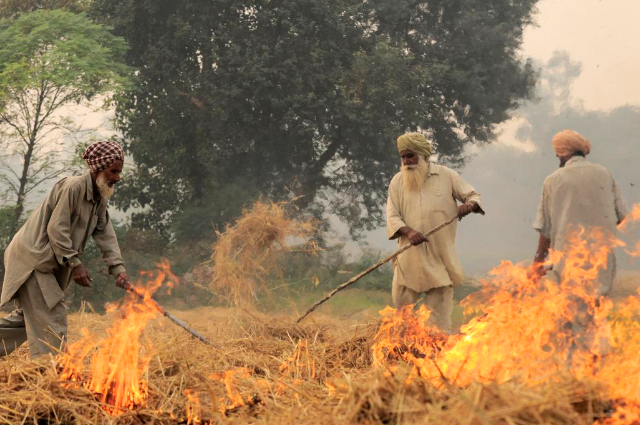Farmers express their struggle due to Stubble Burning, Farmers in Punjab have voiced a strong demand for the government to provide a lasting solution to the pressing issue of stubble burning. They argue that the practice, often blamed for contributing to air pollution is not a choice but a necessity driven by the lack of alternatives. Despite the imposition of heavy penalties, farmers continue to find themselves in a tough spot as they are left with little option but to burn the leftover stubble from their fields.
A Fresh Incident Sparks Renewed Debate
The call for a permanent fix was reignited after a recent incident of stubble burning was reported in Nehian Wala village which is located in Bathinda, Punjab. The occurrence which took place on in 20th of October evening, highlights the ongoing dilemma that farmers in the region face every harvest season. This has led to frustration among the farming community as they believe the government has not adequately addressed the root of the problem.
Farmer's Plea for Support
Ram Singh, a local farmer, emphasized the urgent need for the government to step in with a practical and long-term solution. He expressed his frustration, stating, “The government should find a permanent solution so that the incidents of stubble burning can be reduced. Burning stubble is our compulsion." His statement sheds light on the farmers' perspective where they feel burdened by both the environmental blame and the legal consequences that follow because of stubble burning.
Farmers Feel Unfairly Targeted
Singh also pointed out the broader issue of pollution, questioning why the blame for air quality degradation is directed primarily at farmers. “The government is not giving any solution; rather, cases are being registered against the farmers. They always blame the farmers for pollution. Are there no factories and industries in Delhi and Punjab? Are they not contributing to pollution?” he remarked, highlighting the perceived injustice in how pollution sources are treated. According to him, industries and factories also contribute significantly to pollution but do not face the same level of scrutiny or penalties.
A Call for Balanced Solutions
The farmers’ demand goes beyond just the penalties as they are asking for fair treatment and solutions that do not place the entire burden on them. They want the government to consider alternative methods for managing agricultural waste and to offer support in implementing these measures. Without proper intervention, stubble burning remains an unavoidable consequence for farmers who lack viable and cost-effective options.
Farmer Leader Critiques Haryana's Stubble Burning Policies: Government's Tough Stance Sparks Farmer Discontent
Suresh Koth, a prominent figure among farmers in Ambala, openly criticized the Haryana government's harsh measures aimed at curbing stubble burning. He cautioned that these stringent policies might provoke further agitation among the farming community. The government has enacted severe penalties including lodging First Information Reports (FIRs) against farmers who engage in stubble burning and withholding the Minimum Support Price (MSP) for their crops.
Call for Practical Solutions
During his visit to the grain market in Ambala, Koth articulated his dissatisfaction with the government's current strategy. He suggested that if the administration were to provide stubble management equipment to every village then it would significantly reduce the incidence of stubble burning. Koth emphasized that industries are the primary contributors to pollution by urging the government to tackle these underlying issues rather than penalizing farmers who are already facing numerous challenges.
Addressing Farmer Concerns
Koth also raised alarms about deductions made during paddy purchases due to moisture content by asserting that farmers are committed to ensuring that every grain is sold, despite the obstacles they encounter. In a show of solidarity and leadership within the farming community, he appointed local farmer leader Sukhwinder Singh Jalbeda as the district head of his union. This move emphasizes the organization’s dedication to backing farmers’ rights and advocating for their interests in these tough times.
Farmers' Voices Against Government Policies: Pollution Responsibility and Farmer Rights
Suresh Koth, a leader representing farmers, has raised significant concerns regarding the Haryana government's approach to managing stubble burning. He pointed out that farmers contribute only about 3 to 4 percent of pollution, while the bulk of pollution stems from industrial activities and vehicular emissions. Koth urged the government to refrain from adopting a dictatorial stance towards farmers by emphasizing that such measures would not be tolerated. He highlighted that stubble burning occurs primarily in areas where farmers lack access to necessary machinery for managing crop residue and he criticized the government's failure to distribute funds from the World Bank designated for these machines to the farming community.
Government Crackdown on Stubble Burning
In response to rising pollution levels, the Haryana government had implemented strict regulations aimed at curbing stubble burning. As mandated by the Commission for Air Quality Management (CAQM), officials are required to register FIRs against farmers who burn or have burned paddy crop residue since September 15. Furthermore, a "red entry" will be made in the Meri Fasal Mera Bayora (MFMB) records of those found guilty, which will prevent them from selling their crops through the e-Kharid portal for the next two seasons. This stringent measure is intended to deter farmers from engaging in practices that contribute to air pollution.
Consequences of Non-Compliance
The government's directive poses serious implications for farmers as those who are penalized will face restrictions that hamper their ability to sell crops in local markets. This has raised alarm among the farming community with Koth asserting that they will not pay any penalties imposed by the government. The ongoing tension between farmers and government authorities highlights a critical need for dialogue and effective solutions that address both environmental concerns and the livelihoods of those who depend on agriculture.
. . .
References:

